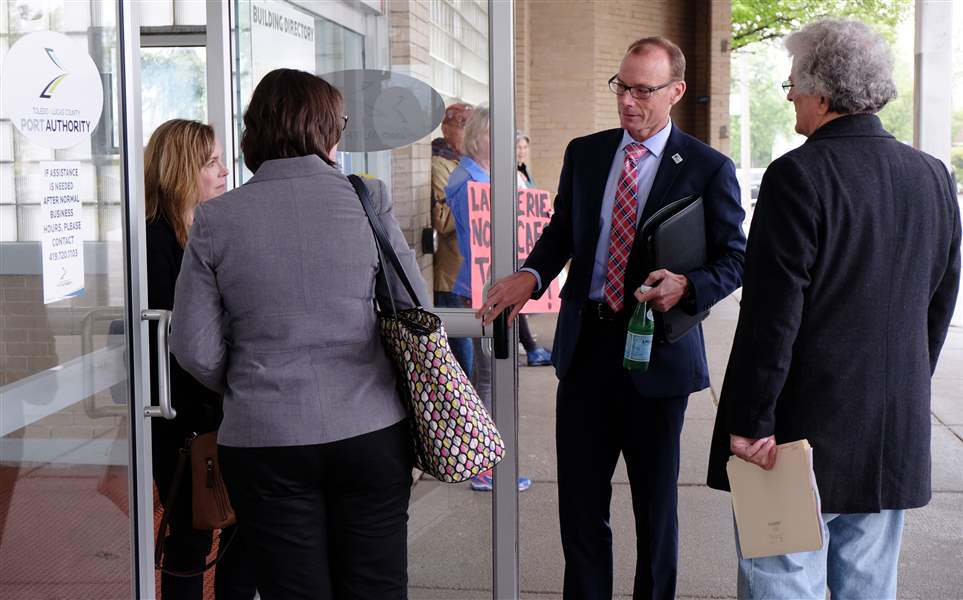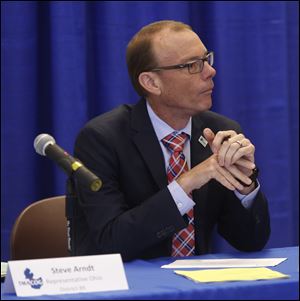
EPA chief: Kasich's comments about impairment taken out of context
5/14/2018
Craig Butler, director of Ohio EPA, center, is confronted by Mike Ferner during an Advocates for a Clean Lake Erie protest before the TMACOG water quality meeting at the Grand Lobby of the Dr. Martin Luther King, Jr. Plaza in Toledo.
THE BLADE/LORI KING
Buy This Image
Ohio Environmental Protection Agency Director Craig Butler was as puzzled as anyone about a Michigan news outlet’s story on Saturday in which Gov. John Kasich appeared to have contradicted what his own administration had done in March regarding Lake Erie impairment.
In the article, published by MLive and based on responses Mr. Kasich gave to questions posed to him at the Michigan Press Association convention in Lansing last Friday, the governor said the open water of Lake Erie isn’t impaired and shouldn’t receive such a designation. The Ohio EPA, though — after years of resistance — declared the open water of western Lake Erie in Ohio as impaired in March, joining Michigan in action it had taken with its much smaller portion of western Lake Erie in 2016.
Mr. Butler told more than 100 people attending a Toledo Metropolitan Area Council of Governments forum Monday that Mr. Kasich’s comments were taken out of context. Mr. Butler was in Toledo to speak with Ohio Rep. Steve Arndt (R., Port Clinton) and University of Toledo law professor Ken Kilbert at an event scheduled weeks ago to discuss Ohio’s next steps in the aftermath of its impairment designation.

Craig Butler, director of Ohio EPA, waits to speak during the Lake Erie Impaired panel discussion at TMACOG water quality meeting at the Grand Lobby of the Dr. Martin Luther King, Jr. Plaza in Toledo.
Mr. Butler later told The Blade the governor apparently got confused while discussing issues pertaining to Cleveland, and thought he was being asked if all of Lake Erie should be designated as impaired. Mr. Kasich’s communications director, Jim Lynch, also told The Blade it’s “absurd” to believe the governor didn’t know or wasn’t willing to accept the western basin’s impairment designation.
“As you know, we developed the model to help us look at the science to make the determination,” Mr. Lynch said.
That model, a collaboration between the administration and several of Ohio’s leading algae experts, generated data that show an impairment designation was scientifically justified as far back as 2010.
Scientists have said at several presentations in recent weeks the administration wanted its own formula developed for what constitutes an impairment designation because it was getting no guidance from the U.S. EPA.
The U.S. EPA reversed itself in January, telling Ohio it needed to reconsider its earlier stance against an impairment designation for a 2016 report it had submitted to the federal agency. But that change of heart on the federal level came only after the Chicago-based Environmental Law & Policy Center sued the U.S. EPA on behalf of Advocates for a Clean Lake Erie. The law center questioned how the U.S. EPA could approve Michigan’s 2016 impairment designation while letting a finding of no-impairment in Ohio go through for what is essentially the same water.
Such reports are required every two years.
Mr. Butler said Ohio is designating the open water of western Lake Erie as impaired for its 2018 report, and will comply with whatever is required of it to bring the region back into compliance for algae-forming phosphorus releases.
He said the state EPA is working with the Ohio Department of Agriculture on a plan for identifying distressed watersheds within the basin, and wants the Ohio General Assembly to expand its rules so commercial fertilizers can be limited in those regions. Currently, the state agriculture director can require nutrient-management plans in areas he or she has identified as distressed, but only for manure applications.
But a transcript of Mr. Kasich’s comments to MLive, which are online below the story, show at least one more misstep by the Ohio governor when he claimed the state of Ohio had stopped the U.S. Army Corps of Engineers from dumping dredged material into the open lake.
The Ohio General Assembly has passed a bill calling for the practice to be phased out by 2020. But the Corps is still doing that in the Toledo area, where its 2018 permit calls for as much open-lake dumping as ever. The phase-out also allows for an unlimited number of one-year exceptions.
Lucas County Commissioner Carol Contrada began Monday’s session by suggesting the recent onslaught of rain might be a symptom of climate change, which scientists believe is contributing to the algae problem.
“We have sudden, intense storms we weren't having even 15 years ago,” Ms. Contrada said. “The solutions are complex, but they are not out of reach.”
Mr. Butler said the Ohio EPA has concluded voluntary incentives have worked in limited areas, but aren’t being embraced widely enough and the state, therefore, has fallen off track in its commitment to reduce phosphorus loading by 40 percent of 2008 levels by 2025.
Mr. Arndt said it appears only a third of Ohio’s farmers have embraced best-management practices, such as cover crops, filter strips, and nutrient injection. More would be willing if the government could subsidize costs, he said.
Paul Pacholski and Dave Spangler, the president and vice president of the Lake Erie Charter Boat Association, said the region needs Ohio Department of Agriculture Director David Daniels to show more leadership with nutrient-management plans.
“We can't continue to do this year after year after year,” Mr. Spangler said. “Who can we get to light a fire under the Department of Agriculture in Columbus?”
Contact Tom Henry at thenry@theblade.com, 419-724-6079, or via Twitter @ecowriterohio.